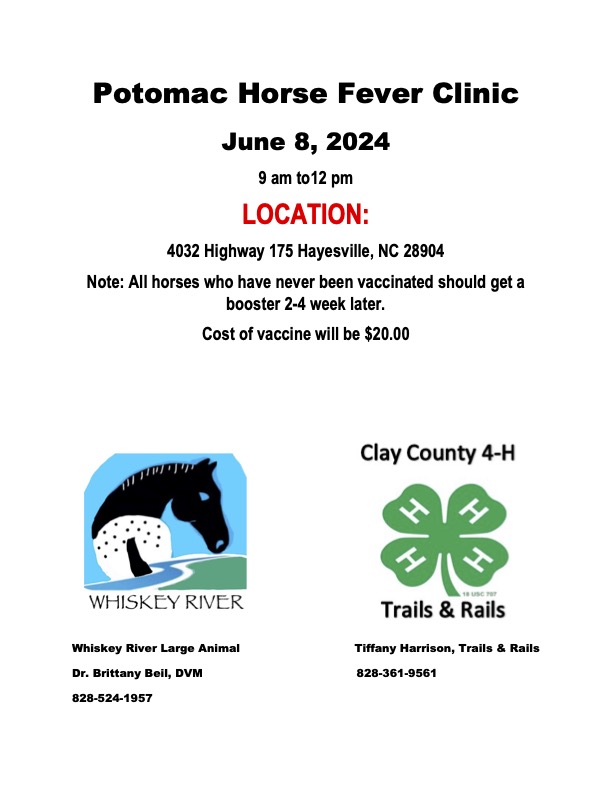Potomac Horse Fever Local Case CONFIRMED – Vaccination Clinic Planned
go.ncsu.edu/readext?1006872
en Español / em Português
El inglés es el idioma de control de esta página. En la medida en que haya algún conflicto entre la traducción al inglés y la traducción, el inglés prevalece.
Al hacer clic en el enlace de traducción se activa un servicio de traducción gratuito para convertir la página al español. Al igual que con cualquier traducción por Internet, la conversión no es sensible al contexto y puede que no traduzca el texto en su significado original. NC State Extension no garantiza la exactitud del texto traducido. Por favor, tenga en cuenta que algunas aplicaciones y/o servicios pueden no funcionar como se espera cuando se traducen.
Português
Inglês é o idioma de controle desta página. Na medida que haja algum conflito entre o texto original em Inglês e a tradução, o Inglês prevalece.
Ao clicar no link de tradução, um serviço gratuito de tradução será ativado para converter a página para o Português. Como em qualquer tradução pela internet, a conversão não é sensivel ao contexto e pode não ocorrer a tradução para o significado orginal. O serviço de Extensão da Carolina do Norte (NC State Extension) não garante a exatidão do texto traduzido. Por favor, observe que algumas funções ou serviços podem não funcionar como esperado após a tradução.
English
English is the controlling language of this page. To the extent there is any conflict between the English text and the translation, English controls.
Clicking on the translation link activates a free translation service to convert the page to Spanish. As with any Internet translation, the conversion is not context-sensitive and may not translate the text to its original meaning. NC State Extension does not guarantee the accuracy of the translated text. Please note that some applications and/or services may not function as expected when translated.
Collapse ▲Saturday evening, a case of colic was referred to a Georgia hospital suspecting colitis. Sunday afternoon, confirmation was recieved that the horse tested positive for Potomac Horse Fever. As far as we are aware, this disease has only been in this area in very isolated cases or only anecdotally in years past. Historically, only at-risk horses have been vaccinated. But with this case, we now feel that the risk is imminent. We are immediately recommending all horses be vaccinated for the disease.
Clay County 4-H has teamed up with Whiskey River Vet to host an emergency vaccination clinic this Saturday, June 8, from 9 a.m. – 12 p.m. at 4032 HWY 175 Hayesville, NC. The cost of the vaccine will be $20.

Please read the points below, for frequently asked questions.
Ten facts to know about Potomac Horse Fever:
- Caused by a bacteria that infects water-loving bugs. The bugs lay eggs/larvae in water, and the horses drink it and get infected.
- It affects the intestinal lining, and symptoms include a high fever, lethargy, and inappetence. Most cases will have profuse watery diarrhea, but not all cases.
- Horses of any age and breed are susceptible, but horses under age 1 year are less common.
- Horses have been known to founder (laminitis) after infection with this bug, due to the severity of the illness.
- Horses CAN die from this, usually of sepsis or dehydration. Early treatment sees the best outcome!
- It CAN be treated successfully! We usually recommend referral to a 24-hour facility, but it can be treated on the farm, with a VERY dedicated caretaker. Treatment is quite intensive. Costs can vary widely.
- There IS a vaccine! The vaccine has been around for a while and is considered very safe. However, it is not completely protective. Most practitioners DO think that having had the vaccine makes the disease less severe, if caught.
- PHF season is usually early spring to late fall, with most cases in late summer to fall. Vaccination is recommended annually at the start of the season, with a booster 4 weeks later, for horses that have never had it in the past. These can be EASILY added to your spring vaccines. First time vaccination would require two visits by your veterinarian.
- It CANNOT be spread from horse to horse, or horse to person. But sometimes horses drinking from the same water source can get sick around the same time.
- You can reduce your horses risk of contracting PHF by reducing standing water around your farm, not allowing drinking from slow moving water sources, and frequently changing out water buckets and troughs to make sure that larvae are not getting a chance to grow in the water.



